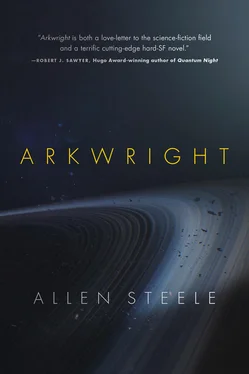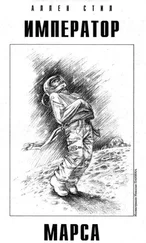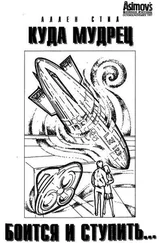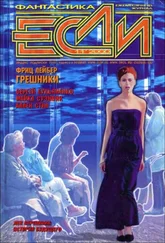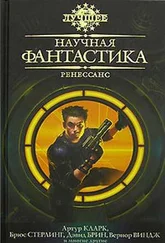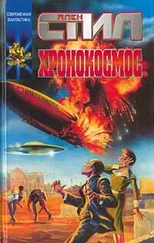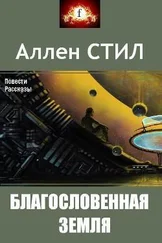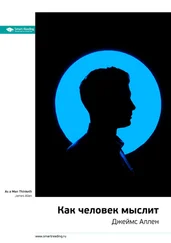“No.” Just as Sanjay was feeling weight return to his body, so he also felt the responsibility of telling others what he’d learned. “My father, my friends, even the Disciples … they have to know the truth.” He glanced at Kaile. “Yes?”
She lay back in her seat, gazing through the windows. “Yes,” she said at last, turning her face toward his to give him an uncertain smile. “They won’t like it, but they deserve to know what everyone in Purgatory already knows.”
Nathan nodded and then looked at Marilyn. “Very well, then,” he said, letting out his breath. “We’re go for touchdown.”
“Make it the beach,” Sanjay said. “Plenty of room there.”
Far below, Providence was coming into view. The last light of day was touching the thin white strip of its coast, and although he still couldn’t make out Childstown, he knew that those who lived there had probably seen the bright star descending from the sky and the birdlike object it had become. The bell in the watchtower was being rung, and townspeople were emerging from their homes and workshops to stare up at the strange thing descending upon them.
He smiled to himself, imaging R’beca’s reaction when she saw the craft alight upon the waterfront and who would emerge from it. Soon, there would be no more heretics. Another thought amused him, and he laughed out loud.
Kaile looked at him sharply. “What’s so funny?”
“I’m going to be busy soon,” he replied. “We’re going to need more boats.”
Puzzled, Kaile shook her head. Sanjay didn’t explain what he meant, though, but instead gazed up at the sky. Galactique was there, as it had always been, but he now knew that its long journey had finally come to an end.
And another journey was about to begin.
The meeting hall of First Town was filled almost to capacity when Nathan Arkwright stood up to speak. Most of the people who’d gathered there that winter morning were mainly townspeople, but quite a few of them were recent immigrants from Providence who’d come to the place once known as Purgatory of their own free will, while a dozen or so were newly arrived Earth colonists who’d lately established the new settlement just south of First Town. On the second day of Feb, springtime was still another week away, so there was time for everyone to relax from their chores and hear what the expedition commander had to say.
A podium had been set up at the front of the room, a handsome bambu lectern that was a little short for him but nonetheless would serve as a convenient place to lay his reading matter. Nathan pulled a book from the jacket he wore over his exoskeleton and was about to speak when something like a distant thunderclap caused him to look up. Many of the people seated on the floor mats did the same, particularly the Eosians, who’d only lately heard a sonic boom, let alone know what caused them. They were startled by the roar of another shuttle from the Tyson entering the atmosphere, but Nathan’s shipmates just looked at one another and smiled knowingly.
Nathan waited for the noise to subside. “Sounds like we’ll soon have company,” he said, and his audience gave an appreciative, if somewhat nervous, laugh. “Perhaps it’s appropriate,” he continued. “A long time ago, the man who made it possible for us to be here today would have enjoyed hearing that. He was my ancestor and namesake, and I think he probably would’ve dropped everything and run outside to watch. When he was alive, humans had only recently begun to venture beyond Earth. In his time, relatively few people like him even dared to imagine that something like this”—he raised his hands to encompass the room—“would ever occur beyond the confines of the stories he and his colleagues told.”
Those from Earth nodded in agreement. Those who’d been born on Eos, though, gazed at him in confusion, not understanding what he meant.
“My ancestor was Nathan Arkwright,” he continued. “I share his name, but the truth of the matter is that some of you are more directly related to him than I am. In terms of the Arkwright family tree, I’m just a distant relative, the scion of cousins who barely knew him when he was alive. But his genome was represented on the Galactique and therefore became part of the gene pool whose blood now flows in many of your veins. So I know that I’m speaking to not only his direct descendents but also those of his family and friends. And I consider this to be an honor.”
As he spoke, Nathan absently tapped his fingers against the cover of the book he’d brought with him. It was a very old volume, published over five hundred years earlier, one of only a small handful of copies that still existed—a miracle in itself, considering how cheaply it had been printed. Nathan could have read electronic text, which would have been just as good, but this book was a family heirloom that he’d brought with him from Earth in hopes that, one day, he’d be able to do this very thing.
“So I want to read to you a little bit of what Nathan Arkwright imagined all those centuries ago … before Eos, before Galactique, before the very idea of traveling to the stars was anything but the wildest fantasy.” Nathan felt a rawness in his throat; he coughed in his hand, blinked back the tears that threatened to run from the corners of his eyes, and went on. “I like to believe that his stories inspired the voyages that brought us to this world, but I know that his were only a few of many. There were countless other visionaries like him, and all had faith in the future.”
With this, he opened the book and began to read The Galaxy Patrol .
Arkwright was inspired in large part by the 100 Year Starship Symposium, cosponsored by DARPA and NASA and held in Orlando, Florida, in October 2011, and also by the Starship Century conference, sponsored by the Arthur C. Clarke Center for Human Imagination and held at its location on the University of California–San Diego campus in May 2013. I was a participant at both conferences, and it was during the second in particular that this novel was conceived.
So it’s to the organizers and my fellow participants of these two conferences that I owe my gratitude. I’m especially grateful to Greg and Jim Benford for inviting me to the Starship Century conference and for giving me feedback for this book, Geoffery Landis for helping me understand the technical details of microwave beam propulsion systems, and Microwave Sciences for the fundamental design of Galactique ’s beamer and beamsail.
In addition, I’d like to thank Bob Madle and David Kyle for sharing their memories of the 1939 World Science Fiction Convention, Betsy Wollheim for letting me know a bit about her father, Donald A. Wollheim, that I wouldn’t have learned otherwise, Gardner Dozois, Susan Casper, and Michael Swanwick for acquainting me with Philadelphia’s neighborhoods, Jack McDevitt for educating me in the rules of softball and an imaginary political cartoon, and Rob Caswell and Deb Zeigler for a fine interior illustration and for letting me bounce ideas off them.
I’m very grateful to Sheila Williams for making it possible for parts of this novel to first appear as a series of stories in Asimov’s Science Fiction, my editor at Tor, David Hartwell, for coming to the rescue, and his assistant, Jennifer Gunnels, for becoming the book’s guardian angel. My literary agent, Martha Millard, stood by me even when she probably would have liked to strangle me instead.
As always, my deepest gratitude to my wife, Linda, who has watched me write twenty novels and lived to talk about it.
—Whately, Massachusetts
September 2013–November 2014
Читать дальше
